#morrie ryskind
Explore tagged Tumblr posts
Text

#of thee I sing#george gershwin#ira Gershwin#george s. kaufman#morrie ryskind#gershwins#Pulitzer Prize for Drama#Pulitzer Prize winners#broadway musicals#broadway musical#broadway#vintage broadway#musicals#musical theatre#musical theater#musical comedy
1 note
·
View note
Text
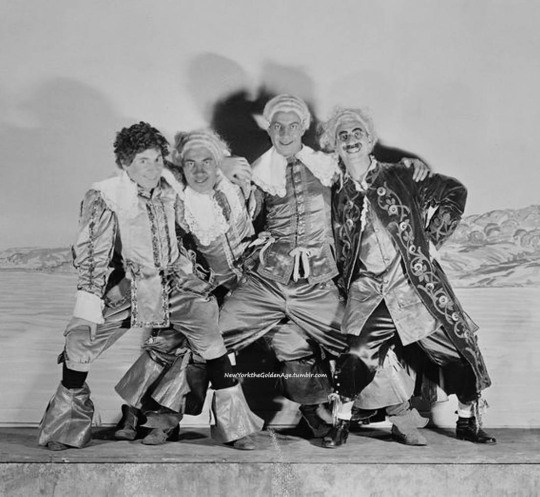
The Marx brothers: Harpo, Zeppo, Chico, and Groucho, in Animal Crackers, dressed as musketeers, 1928, at the 44th St. Theater. Book by George S. Kaufman & Morrie Ryskind. Music & lyrics by Bert Kolmar and Harry Ruby. Costumes by Mabel Johnston. Set by Raymond Sovey.
Margaret Dumont was also in the cast and, in the ensemble, a young dancer named Hermes Pan, who would go on to choreograph many of Fred Astaire's movies. The show ran for 191 performances, which in those days meant it was a great hit.
Photo: Vandamm via the NYPL
#vintage New York#1920s#Vandamm#Marx Brothers#Marx Bros.#Animal Crackers#Harpo Marx#Zeppo Marx#Chico Marx#Groucho Marx#vintage Broadway#Hermes Pan#vintage theater#Margaret Dumont#vintage NYC
159 notes
·
View notes
Text
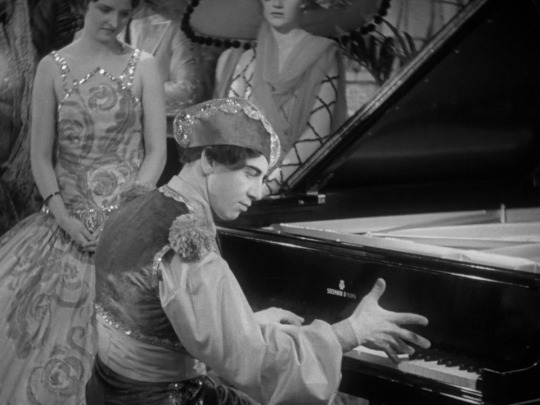
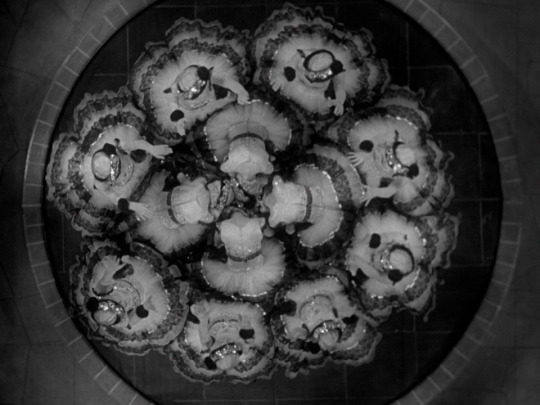

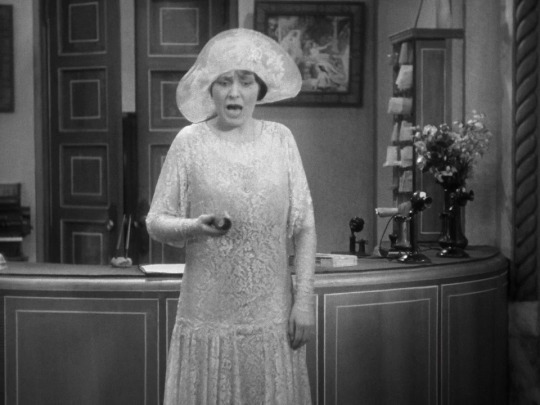
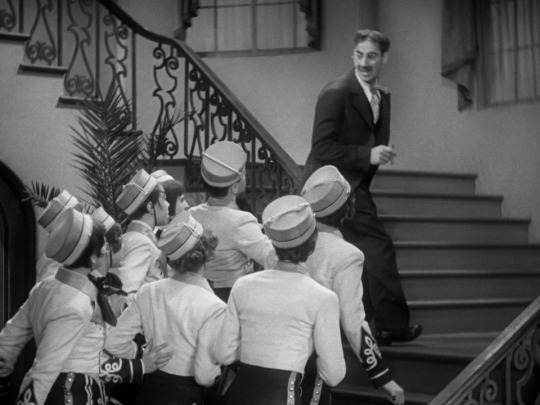
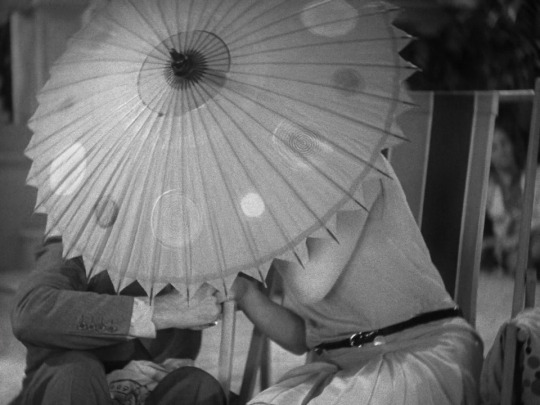




"Three years ago I came to Florida without a nickel in my pocket. Now I've got a nickel in my pocket."
The Cocoanuts, 1929.
Dir. Robert Florey & Joseph Santley | Writ. Morris Ryskind & George S. Kaufman (Original Stage Play) | DOP George J. Folsey & J. Roy Hunt
#the cocoanuts#the marx brothers#robert florey#joseph santley#us film#1920s#musical comedy#comedy#10 frames
29 notes
·
View notes
Text
Another new episode! Getting into the home stretch!
Script below the break
Hello and welcome back to The Rewatch Rewind! My name is Jane, and this is the podcast where I count down my top 40 most frequently rewatched movies in a 20-year period. Today I will be discussing number 8 on my list: Universal Pictures’ 1936 screwball comedy My Man Godfrey, directed by Gregory La Cava, written by Morrie Ryskind and Eric Hatch, based on a book by Eric Hatch, and starring William Powell and Carole Lombard.
The rich and spoiled Bullock sisters, Irene (Carole Lombard) and Cornelia (Gail Patrick), are participating in a scavenger hunt that requires them to find a “forgotten man,” so they race to a shanty town at a city dump. Cornelia gets there first and approaches a homeless man named Godfrey (William Powell), who finds her rude and condescending and therefore refuses to take her offered $5, instead causing her to fall into an ash pile. Irene is amused by Godfrey’s treatment of her sister/rival, and after a brief conversation, Godfrey is amused enough by Irene to agree to be her forgotten man. Irene is so grateful to him for helping her win the scavenger hunt against Cornelia that she offers him a job as the butler for their wacky family, and he accepts without having any idea what he’s in for.
I remember being introduced to this movie rather early in my foray into old Hollywood back in 2002. I can’t recall my exact first impressions, but I’m pretty sure I had seen it several times and was already kind of obsessed with it before I started keeping track of the movies I watched. Once I started keeping track, I watched My Man Godfrey six times in 2003, three times in 2004, three times in 2005, twice in 2007, once in 2008, twice in 2009, once in 2010, twice in 2011, once in 2013, once in 2014, once in 2017, once in 2018, twice in 2019, twice in 2020, once in 2021, and once in 2022.
The main thing that initially drew me to this movie was its silliness. Based on the movies I’ve talked about on this podcast so far, I think it’s pretty clear that I love to watch a bunch of ridiculous characters having a fun romp, and that’s what a lot of My Man Godfrey is. Angelica, the scatterbrained mother of the Bullock family, played delightfully by Alice Brady, is one of the silliest characters in any movie ever, and when I was a young teen, all she had to do was open her mouth to crack me up. Now I find some of her antics a bit grating, which they are definitely meant to be, but some of her lines do still make me laugh every time, like, “I’m positive I didn’t ride a horse last night because I didn’t have my riding costume on!” and “If you’re going to be rude to my daughter, you might at least take your hat off!” and, in response to Godfrey saying that he sold short to save the family from financial ruin, “I don’t understand, you sold short? You mean, gentlemen’s underwear?” My brother was particularly tickled by that last one as a child, to the point that when we played The Sims together, we created a character named Gentleman’s Underwear after that line.
Angelica is far from the only silly character in this movie, and what I love about the whole ensemble is that each character is entertaining in a different way. Angelica is scatterbrained and doesn’t really care what’s going on, while her husband Alexander (played by Eugene Pallette) has lost track of what’s going on mostly because he’s so fed up with his wife’s ridiculousness. And then there’s Carlo (played by Mischa Auer) who is Angelica’s “protégé,” and I’m still not really sure exactly what that means. I can’t tell if it’s a euphemism, or if she’s like, supposed to be teaching him piano? We definitely see him playing piano, and eating, and impersonating a gorilla, and reading to Angelica, and that seems to be all he does. So unclear what his purpose is, but he is amusing. On the other hand, Molly (played by Jean Dixon, who also played Edward Everett Horton’s wife in Holiday) has the very clear purpose of being the Bullock family’s maid. Her dry, sarcastic wit is amusing in an entirely different way that I love very much. There’s also Tommy Gray (played by Alan Mowbray), a friend of the Bullock family who also happens to recognize Godfrey from their college days. Not wanting to reveal that he came from a wealthy Boston family, Godfrey says that he was Tommy’s valet in college, forcing Tommy to try to invent a story explaining why Godfrey wouldn’t have given him as a reference when the Bullocks hired him. Tommy seems like a relatively normal guy who isn’t particularly bright. Watching him flounder in that scene could have easily become uncomfortable, but they managed to portray it in a way that’s just silly. And his invention of a wife and five children for Godfrey adds to the confusion and tension behind the main romance in the movie.
If you’ve listened to previous episodes of this podcast and have an especially keen memory, you may recall that Gregory La Cava also directed Stage Door, which was number 31 on my list and came out the year after My Man Godfrey. I’m not sure how much say he had in the casting of both of those movies, but I enjoy that there are several people who appeared in both, such as character actors Franklin Pangborn and Grady Sutton, neither of whom was credited in My Man Godfrey but both of whom make memorable appearances. The most notable cast member the two movies have in common is Gail Patrick, who was Ginger Rogers’s main rival besides Katharine Hepburn in Stage Door and Cornelia Bullock in My Man Godfrey. In both of these, as in most of her movies, Patrick’s character is rather unpleasant, but Cornelia is a bit more complex than that, and she fascinates me. She’s bitter and spoiled and mean to her sister and can’t decide if she wants to seduce Godfrey or hurt him or both. After Godfrey tells her what he thinks of her, she tries to frame him for robbery by hiding her pearl necklace under his mattress, but he manages to find it and hide it better before the police search his room. Cornelia is so insistent that it must be under the mattress that the police get suspicious and ask why she’s so sure of that, to which she responds with the amazing and thoroughly unconvincing line, “I read that that’s where people put things when they steal them!” Shockingly, even after all of this, the story actually redeems Cornelia somewhat. Godfrey is able to save the family financially by pawning her necklace, and after he reveals this he tells her that he, too, was once a spoiled child, and that she has the potential to be a good person if she so chooses. Cornelia is visibly moved by his words, and while we unfortunately never see her again after that scene, I like to believe that she takes them to heart and stops being so awful going forward.
But as much as I love all the supporting characters, I don’t think I’d have watched this movie nearly as many times if not for the leads. William Powell brings just the right combination of sophistication and jadedness to the role of Godfrey, making it easy to believe that he was once a rich man but lost everything he had to a woman he loved who betrayed him. It’s beautiful to watch him rediscover his own purpose and humanity in response to the Bullocks’ kindness and choose to focus on the positive aspects of their quirks. When William Powell was offered the role of Godfrey, he agreed to take it only if Carole Lombard would play Irene, knowing that she would be perfect, and he was completely correct. Lombard absolutely kills it as Irene, flawlessly combining the dramatic naïveté of an overgrown toddler with a genuine desire to be a good and mature person. And the way Powell and Lombard play off each other is utterly delightful. Their first conversation sets up their dynamic beautifully – he’s rather amused by her, but she takes everything he says extremely seriously. Like when she asks him, “Why do you live in a place like this when there are so many nice places?” and he responds, “It’s because my real estate agent felt that the altitude would be very good for my asthma,” she doesn’t seem to know that he’s joking, and says, “Oh my uncle has asthma!” And he just rolls with it and replies, “No! Well, now there’s a coincidence!” This is already funny as written, but their delivery and facial expressions make it so much funnier. Then probably my favorite part of the movie is when Irene is sulking and trying to get Godfrey to notice her, but she mostly just comes across as ridiculous, and Cornelia is heckling her mercilessly. Godfrey is trying to act uninterested, but it’s clear from a few of his glances in her direction that he really does want to give her the attention she craves. It’s readily apparent from all of their scenes that they both thoroughly understood the assignment and knew how to play off each other. Powell and Lombard had worked together twice before and had even been briefly married to each other from 1931 to 1933. Despite the fact that things didn’t work out between them romantically in real life, they remained good friends, and seem to have only used their history to bring out the best performance in each other here. It is kind of funny that Godfrey keeps telling Irene that she’s way too young for him because it’s like, “You clearly didn’t think she was too young when you married her five years ago!” Mostly, though, it just makes me really happy as someone who has no interest in pursuing romantic relationships to know that it was Powell and Lombard’s post-divorce friendship that led to possibly the best movie that either of them ever made. It’s so encouraging to see the evidence that sometimes the relationship between two people can actually get better when they stop trying to make it romantic.
However, it took me a while to see things that way, because in the movie itself, Godfrey and Irene do end up together romantically. Once I learned that the actors were divorced in real life, my first thought was more, “Wow, amazing that they could still pretend to be in love after falling out of love.” In more recent rewatches, I’ve come to realize that the romance in the movie is very weird – which, to be fair, is quite usual for screwball comedies – but I think as an obliviously aromantic teenager it greatly informed what I thought romance was. Irene meets a nice man who helps her win a game against her awful sister and decides to be in love with him, so all she has to do is convince him that he’s also in love with her. Not understanding that romantic attraction was a thing that I was not experiencing, teenaged me thought that was how that worked: you just pick somebody and decide you have a crush on them, and if the other person has also picked you to be their crush, romance is born. Right? Apparently not. Anyway, in more recent rewatches, when it gets to the part where Godfrey tells Irene, “You’re grateful to me because I helped you to beat Cornelia. And I’m grateful to you because you helped me to beat life. But that doesn’t mean that we have to fall in love,” I’m like, “Correct! It doesn’t mean that! You don’t have to fall in love!” But the movie implies that Godfrey is suppressing his feelings for Irene because of the previous bad relationship that led to his homelessness, and it expects us to all be on board with the way Irene follows him after he quits and basically forces him to marry her. The older I get, the more this ending bothers me. I realize that it’s meant to be part of the screwball silliness of it all, and that it was inevitable for a movie like this to make the male and female lead end up together, but it’s like, can we maybe make sure that Godfrey is on board with that first? I can very much see their marriage going the same way as that of the actors who played them, with Irene and Godfrey ultimately concluding that they’re better suited as friends than lovers. But again, as a young person watching this movie, I thought their relationship was beautiful. Soon after I first got really into My Man Godfrey, my friend had a Build-A-Bear birthday party, and I named my bear Godfrey. I can’t remember who I was talking to or how this came up, but I remember making the declaration that if I was still single at 40, I would marry that Godfrey bear. So if you’re listening to this, consider yourself invited to our wedding in seven years. It probably won’t be much weirder than Irene and Godfrey’s wedding at the end of this movie.
There is another element to My Man Godfrey besides its silliness and unconvincing romance that makes it particularly fascinating. While most 1930s screwball comedies seem to be intended to help audiences temporarily forget about the hardships of the Great Depression, My Man Godfrey uses the Depression as a big part of the plot. The rich are portrayed as frivolous and ridiculous, while the homeless “forgotten men” are portrayed as resilient and noble. Godfrey reveals to Tommy that after having his heart broken, he intended to drown himself in the river, but seeing people living at the dump next to the river, determined to survive despite their circumstances, made him change his mind. The hard times even impact the well-to-do, with Alexander Bullock nearly losing everything in bad investments. At first it seems odd that Godfrey would use the money from Cornelia’s necklace merely to help the rich snobs, but then it’s revealed that in addition to that, he converted the dump he used to live in to a nightclub, creating jobs, and affordable housing. And all of that was possible because the jobless men convinced Godfrey to keep living, then Irene was nice enough to employ Godfrey as a butler, and Cornelia was bitter enough to try to frame him for robbery. I assume that doing something like that would not have been nearly as easy as the movie makes it look, but I appreciate that instead of leaning into the pure escapism of so many films from that era, My Man Godfrey says, “Yes, times are hard, but don’t give up hope. Things can improve unexpectedly at any time. And small kindnesses can add up to make a very big difference.” And that message continues to resonate 87 years later. So while this is mostly a very silly comedy, its genuine moments showing the importance of human connection help keep it from descending into complete and utter chaos like some other screwball comedies I could name.
And perhaps it was that touch of seriousness that led this mostly silly comedy to six Oscar nominations: Gregory La Cava for Best Director, Eric Hatch and Morrie Ryskind for Best Adapted Screenplay, William Powell for Best Actor, Carole Lombard for Best Actress, Mischa Auer for Best Supporting Actor, and Alice Brady for Best Supporting Actress. This made My Man Godfrey the first movie to be nominated in all four acting categories, which isn’t saying much because that was also the first year that the Oscars had four acting categories, but it remains the only film to this day to be nominated in all four acting categories without being nominated for Best Picture. And it was the only movie to be nominated in those six categories without winning anything until American Hustle, 77 years later. Of all the people nominated for Oscars for My Man Godfrey, only Alice Brady would ever win one, for In Old Chicago the following year. The director and one of the writers would each be nominated once more, also the following year, for Stage Door. William Powell had been nominated once before, for 1934’s The Thin Man, and would be nominated again for 1947’s Life With Father. But this was the only nomination for both Mischa Auer and Carole Lombard. Lombard in particular really wanted an Oscar and moved on to dramatic roles for a few years hoping that would help, but it didn’t. So she briefly returned to comedy before her career and life were tragically cut short by a plane crash in 1942, when she was only 33 years old. So, my age. I feel like, had Carole Lombard lived longer and continued to make more films in a similar vein, she probably would have made it into more than one of my top 40. The more I rewatch My Man Godfrey, the more impressed I become with her performance. This is one of the few old movies that actually has a blooper reel available, and that shows just how different her normal speech and facial expressions and mannerisms were from Irene’s. I have watched and enjoyed several of Lombard’s other films, but a lot of them are a bit too silly even for me, and I really wish she could have been in more of the still fun and kooky but not-quite-as-screwball-as-the-‘30s comedies that were just starting to become popular around the time of her death. But at least we get to see her in My Man Godfrey. Thank you, William Powell.
My Man Godfrey was remade in 1957, and I watched that version one time in 2003, reacted with, Ew, they ruined it,and have never rewatched it. Maybe I will someday, just to see if it’s as bad as I remember it. No offense to that cast – there was no possible way to reach the standard set by the original. Sometimes remakes are great, but sometimes the original was already perfect and shouldn’t be messed with, and in my opinion, My Man Godfrey absolutely falls into the latter category. So what I’m saying is, if this podcast has made you want to watch this movie, make sure you get the 1936 version.
Thank you for listening to me discuss another of my most frequently rewatched movies. Next week I will be joined by not one but two very special guests, to discuss the longer of the two movies I watched 30 times, which is going to be very fun, so stay tuned for that. As always, I will leave you with a quote from that next movie: “Wait up! Wait for me! Not you, I don’t even know you!”
#my man godfrey#gregory la cava#william powell#carole lombard#this movie is so good#the rewatch rewind
11 notes
·
View notes
Text
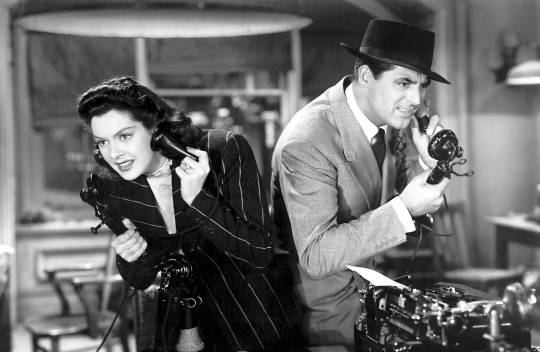
Rosalind Russell and Cary Grant in His Girl Friday (Howard Hawks, 1940)
Cast: Cary Grant, Rosalind Russell, Ralph Bellamy, Gene Lockhart, Porter Hall, Ernest Truex, Cliff Edwards, Clarence Kolb, Roscoe Karns, John Qualen, Helen Mack, Billy Gilbert. Screenplay: Charles Lederer, based on a play by Ben Hecht and Charles MacArthur. Cinematography: Joseph Walker. Art direction: Lionel Banks. Film editing: Gene Havlick. Music: Sidney Cutner, Felix Mills.
I can never make a list of my ten favorite movies because once I get started I keep remembering the ones that absolutely have to be on the list. But His Girl Friday always claims a place somewhere, higher or lower. It's a movie without which life would be just a little poorer. The play on which it's based, The Front Page, was no slouch to start with. Ben Hecht and Charles MacArthur crafted the single best portrait of what it might have been like -- according to the accounts of others -- to be a newspaper reporter in the first half of the twentieth century, when there was neither television nor the internet to make one's profession obsolescent. We don't have to believe that it was always like that, but just that occasionally reporters in the big cities had moments like the ones shown in the movie. And then Charles Lederer, with uncredited help from Hecht, Howard Hawks, Morrie Ryskind, and a cast skilled at ad libbing, turned it into a romantic screwball comedy by changing the sex of one of the leads, Hildy Johnson, from male to female. And after lots of actresses who would have been just fine in the part (Katharine Hepburn, Carole Lombard, Irene Dunne, Jean Arthur) turned it down, Hawks cast Rosalind Russell in probably her greatest role. Is there a better matched team than Russell's Hildy and Cary Grant's Walter Burns? We can see both why they got divorced and why they could never be separated. And adding Ralph Bellamy as the patsy was a masterstroke, even though it's essentially the same role he had played three years earlier in The Awful Truth (Leo McCarey, 1937): the stuffy guy who loses out to Grant, perhaps because, as Burns observes, "He looks like that guy in the movies, you know ... Ralph Bellamy." The whole thing moves so brilliantly fast that you don't have time to reflect on the film's flaws, which include a racist gag about "pickaninnies" and a deep confusion about whether it's satirizing or valorizing its characters' callous indifference to other human beings -- notably the moment when Hildy sardonically refers to her fellow reporters as "Gentlemen of the press" after their harassment of Mollie Malloy (Helen Mack), but then immediately reverts to get-the-story-at-any-price behavior. What keeps it all skimming swiftly above reality is the astonishing skill of the leads (notice how long some of the takes are to realize how great their timing and command of dialogue was) and a gallery of great character players: Gene Lockhart, Roscoe Karns, John Qualen, and especially the hilarious Billy Gilbert as Joe Pettibone: If you can tear your eyes away from him long enough, watch how hard Grant and Russell are working to keep from cracking up at his performance. Oh, hell, stop whatever you're doing and just go watch it.
4 notes
·
View notes
Text


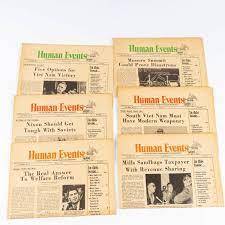
44) Human Events - amerykańska konserwatywna stroa internetowa poświęcona wiadomościom politycznym i analizom. Założona w 1944 roku jako gazeta drukowana, Human Events stała się publikacją wyłącznie cyfrową w 2013 roku. Human Events bierze swoją nazwę od pierwszego zdania Deklaracji Niepodległości Stanów Zjednoczonych: "When in the course of human events…" [„Kiedy w trakcie wydarzeń ludzkich...”]. Czasopismo było wydawane w Waszyngtonie, ostatnio przez Eagle Publishing, właściciela Regnery Publishing, spółki zależnej Phillips Publishing. Thomas S. Winter był redaktorem naczelnym, a Cathy Taylor dyrektorem redakcyjnym wydania drukowanego. Od 2021 roku witryna jest współwydawana przez Jeffa Webba i Willa Chamberlaina.
Human Events zostało założone w 1944 roku przez Felixa Morleya, Williama Henry'ego Chamberlina, Franka Hanighena i Henry'ego Regnery'ego. Morley był wcześniej redaktorem The Washington Post od 1933 do 1940 roku. Regnery pracował wcześniej dla Resettlement Administration, federalnej agencji z czasów Nowego Ładu. Na początku Human Events było „tygodnikiem informacyjnym o niskim nakładzie, skupiającym się na polityce zagranicznej”, napisał George H. Nash w The Conservative Intellectual Movement in American Since 1945. Human Events miało tylko 127 subskrybentów w pierwszym roku. Po powrocie z podróży do Europy w 1949 roku Morley skrytykował zimną wojnę, co doprowadziło do nieporozumie�� z Hanighenem i Regnerym w kwestii zwalczania komunizmu. Po tym, jak Hanighen i Regnery odrzucili jego propozycję wyłącznej kontroli redakcyjnej nad czasopismem, Morley zrezygnował w 1950 r. ze stanowiska redaktora Human Events, co Nash opisał jako „kolejny produkt tarć między starą a nową prawicą”. W 1951 r. Frank Chodorov, były dyrektor Henry George School of Social Science w Nowym Jorku, zastąpił Morleya na stanowisku redaktora, łącząc jego newsletter, analizę, z Human Events.
Na początku lat 60. XX wieku publikację nabyli Allan Ryskind (syn Morrie Ryskinda) i Thomas Winter. Wśród autorów piszących do Human Events od lat 60. do 80. XX wieku byli m.in. Spiro Agnew, James L. Buckley, Peter Gemma, Pat Buchanan, Ralph de Toledano, Russell Kirk, Phyllis Schlafly, Murray Rothbard i Henry Hazlitt. Do 1964 roku nakład Human Events przekroczył 100 000 egzemplarzy. Podczas prezydentury Richarda Nixona, Human Events stało się „prawdopodobnie najbardziej wpływowym konserwatywnym czasopismem w waszyngtońskiej społeczności politycznej”, napisał Nash. Inni stali autorzy to Robert Novak, Ann Coulter, Terence P. Jeffrey i John Gizzi, jego główny redaktor polityczny. Wśród współpracowników znaleźli się Sean Hannity, Newt Gingrich, Paul Craig Roberts, Cliff Kincaid i Pat Sajak. Newsweek doniósł, że chociaż Human Events nie miał dużego grona czytelników poza obszarem Waszyngtonu, „ten mały, twardy tabloid cieszy się wpływem nieproporcjonalnie dużym do jego nakładu”. Human Events poparło interwencję wojskową USA w wojnie w Wietnamie; po zakończeniu wojny publikacja obwiniała amerykańskich liberałów za upadek Wietnamu Południowego.
W lipcu 1985 roku Human Events udzieliło kwalifikowanego wsparcia dla apartheidu w RPA, opisując kraj jako „prozachodni bastion, który zapewnia swoim czarnoskórym więcej wolności i bogactwa niż zdecydowana większość czarnych państw afrykańskich”. Human Events opisało również Nelsona Mandelę jako główną przeszkodę dla pokoju w RPA: „Podczas gdy prezydent Botha działa w szybkim i zaciekłym tempie, aby zakończyć system apartheidu, Mandela pozostaje tak samo nieugiętym rewolucjonistą jak zawsze. Nadal jest marksistą, nadal człowiekiem przemocy, nadal zwolennikiem komunistycznego ANC”. Nie obyło się jednak bez współczucia dla trudnej sytuacji czarnoskórych w tym systemie, dając aktywistowi czarnej siły Steve'owi Biko przemyślany nekrolog. Perspektywa przedstawiona w całym tekście była taka, że rządy marksistowskie w RPA były najgorszą opcją, bez względu na to, jak złe mogą być inne. Eagle Publishing wystawiło czasopismo na sprzedaż w lutym 2013 r., ogłaszając, że zamknie publikację, jeśli nie znajdzie nabywcy. 27 lutego 2013 r. Human Events ogłosiło, że po 69 latach zaprzestanie wydawania wersji drukowanej, ale będzie nadal utrzymywać strony internetowe HumanEvents.com i RedState z oryginalnymi doniesieniami. Eagle Publishing, które nabyło czasopismo w 1993 r., oświadczyło, że dotowało publikację przez kilka lat, ale nie stać go już na to: „rzeczywistość 24-godzinnego cyklu informacyjnego i brutalna ekonomia tygodnika drukowanego stały się nie do pokonania”. Human Events drukowało 40 000 egzemplarzy tygodniowo i zatrudniało 15 pracowników na pełen etat. Plan „restrukturyzacji”, który obejmował zwolnienia, został już podjęty, ale okazał się niewystarczający, aby umożliwić kontynuację wydania drukowanego. W styczniu 2014 roku Eagle Publishing zostało przejęte przez Salem Media Group.
W marcu 2019 roku pisarz polityczny Raheem Kassam i prawnik Will Chamberlain kupili Human Events od Salem Media Group za 300 000 dolarów z zamiarem przywrócenia Human Events do regularnej publikacji online. 1 maja 2019 roku Human Events zostało ponownie uruchomione pod kierownictwem Kassama jako globalnego redaktora naczelnego i Chamberlaina jako wydawcy. 8 sierpnia 2019 roku Human Events ogłosiło, że Kassam opuszcza placówkę, a obowiązki redaktora naczelnego przejmie Chamberlain. W grudniu 2020 roku Human Events ogłosiło, że Jeff Webb, założyciel Varsity Spirit, został mianowany współwydawcą i starszym redaktorem wiadomości, a Webb i jego zespół zbudują codzienną platformę informacyjną. W maju 2021 r. Human Events ogłosiło, że teoretyk spiskowy Jack Posobiec został zatrudniony na stanowisku starszego redaktora. W maju 2022 r. Human Events ogłosiło, że przejęło The Post Millennial, kanadyjski konserwatywny internetowy magazyn informacyjny.
Biograf Richard Reeves napisał w 2005 r., że Human Events było „przez lata ulubioną lekturą” byłego prezydenta USA, Ronalda Reagana. Reagan, wierny subskrybent od 1961 r., powiedział, że „pomogło mi to przestać być liberalnym demokratą”, nazywając je „obowiązkową lekturą dla konserwatystów, którzy chcą wiedzieć, co naprawdę dzieje się w Waszyngtonie”. Reagan napisał kilka artykułów do Human Events w latach 70. Podczas kampanii prezydenckiej w 1980 roku Demokraci opublikowali dokument zatytułowany „Ronald Reagan, ekstremistyczny współpracownik — demaskator”, w którym, według biografa Lee Edwardsa, „[jednym z] dowodów ekstremizmu Reagana było to, że czytał konserwatywny tygodnik Human Events”. Po miażdżącym zwycięstwie Reagana w wyborach, Reagan od czasu do czasu pisał lub dzwonił do Wintera lub Ryskinda. „Human Events nie był jednak ulubionym czasopismem nowych ludzi wokół Reagana” — pisze Reeves. „Baker i Darman, a także Deaver, robili, co mogli, by nie umieszczać go w materiałach do czytania, które dawali prezydentowi”. „Kiedy odkrył, że współpracownicy Białego Domu blokują jego dostarczenie, prezydent Reagan zorganizował wysyłkę wielu kopii do rezydencji Białego Domu w każdy weekend”, pisze Edwards, który dodaje, że Reagan zadbał o „oznaczanie i wycinanie artykułów oraz przekazywanie ich swoim asystentom”. Tuż przed podwyżką podatków w 1982 r. Reagan spotkał się z tym, co nazwał „kilkoma starymi przyjaciółmi z Human Events” (wspomniał o Ryskindzie i M. Stantonie Evansie), którzy ostrzegli go przed „nielojalnym” personelem Białego Domu (w szczególności Jamesem Bakerem), który opowiadał się za zawarciem umowy podatkowej z Demokratycznym Kongresem (Reagan następnie zawarł taką umowę, w której za każdego dolara wyższych podatków Kongres obiecał 3 dolary cięć wydatków. Ostatecznie wzrosły zarówno podatki, jak i wydatki). Podczas szczytu w Reykjavíku w 1986 r. Reagan powiedział sekretarzowi generalnemu Komunistycznej Partii Związku Radzieckiego, Michaiłowi Gorbaczowowi, że nie może zrezygnować z Inicjatywy Obrony Strategicznej z powodu „ludzi, którzy byli najbardziej otwartymi krytykami Związku Radzieckiego na przestrzeni lat” — wspomniał o swojej ulubionej gazecie, Human Events, według Reevesa, „Wybijają mi mózg”.
0 notes
Link

In the sketch, Price plays five Shakespearean characters. Each role begins with an introductory refrain, followed by a condensed, over-the-top spoof of a soliloquy and ending with a burlesque of one of Jonson’s hits: Shylock sings a parody of “The Spaniard That Blighted My Life”; Hamlet sings “My Mammy”; King Lear, “April Showers”; Mark Antony, “After the Ball”; and Romeo, “Yoo-Hoo.” Since Price was well known for his imitations of (and rivalry with) Jolson, his performance would have made comedy from the very idea of Al Jolson playing various Shakespearean roles.
#shakespeare#william shakespeare#sketch#comedy#rivalry#theater#theatre#library of america#loa#story of the week#Lorenz Hart#Morrie Ryskind#Georgie Price#vaudeville
8 notes
·
View notes
Text
THE GANG’S ALL HERE
1931
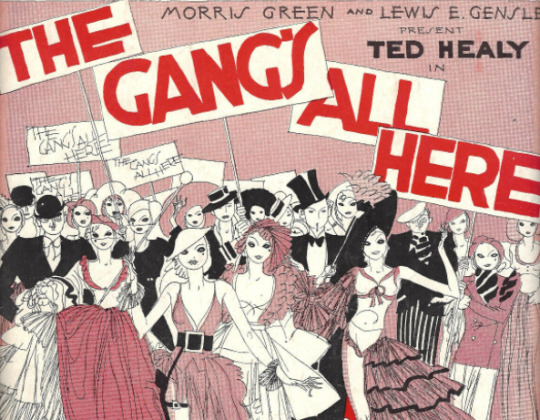
The Gang’s All Here is a 1931 musical comedy with music by Louis E. Gensler, book by Russel Crouse, Oscar Hammerstein II, and Morrie Ryskind, with lyrics by Owen Murphy and Robert A. Simon. It was directed by Frank McCoy and staged by Oscar Hammerstein II.
The plot concerned a war between bootleggers in 1931 Atlantic City NJ, with the second act set mainly in Nantucket RI.
Note: The musical is not related to the popular song “Hail! Hail! The Gang’s All Here” nor the 1943 film starring Carmen Miranda and Alice Faye.
The musical had its out-of-town tryout in Philadelphia, where they realized it was in trouble and called in Oscar Hammerstein as play doctor. Although Hammerstein had no hopes for The Gang’s All Here, he couldn’t say no to his colleagues and agreed to go to Philadelphia to see what he could do to improve the musical.

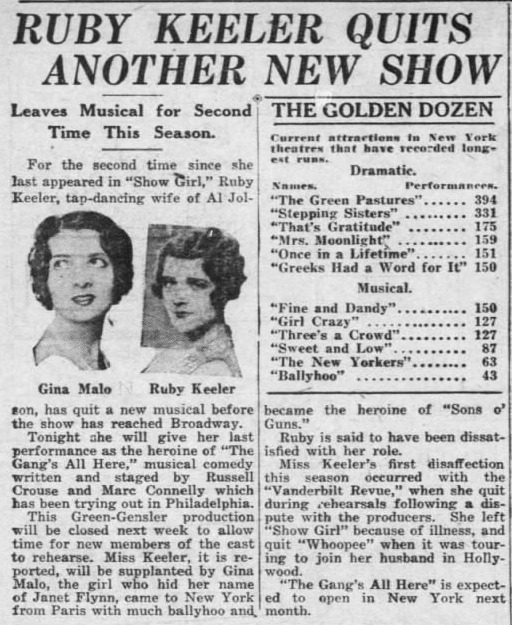
After the Philadelphia tryout at the Shubert, Ruby Keeler (possibly sensing she was in a turkey) departed the cast and was replaced with Gina Malo. Keeler went to Hollywood where she thrived.

After Philadelphia, the show made a short stop at the Shubert in Newark, New Jersey (above) before heading to Broadway’s Imperial Theatre, opening February 18, 1931 and lasting just 23 performances.
One of the unique song titles was “By Special Permission of the Copyright Owner, I Love You”.
Every time a radio is playing, they're saying "And next you will hear us play Something with the publisher's okay" Listening to this great announcer trilling This thrilling new text, told me what to do Try this very notion out on you... I asked your Father, he said "Okay!" I asked your Mother, she said "Hooray!" By special permission of the copyright owner I love you!
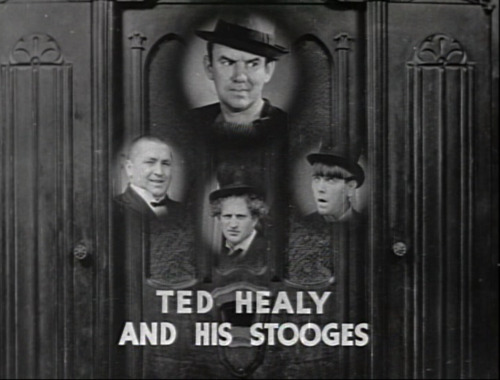
Vaudeville sensation Ted Healy headlined. He is largely remember as the man responsible for “The Three Stooges”. Just prior to this musical, Healy and the original stooges parted ways over a dispute, and Healy replaced them with three other ‘stooges’, who also appeared with him in his next musical, Billy Rose’s Crazy Quilt (May 1931).

The reviews were mostly negative. Brooks Atkinson said that “seldom has a lavish musical struggled so clumsily to reconcile a satiric book with the antics of clowns. Despite feverish re-working, the show was a hurly-burly of disjoined scenes.” Dorothy Parker said that the show was “fantastically confused and preposterously elongated” and “dragged on beyond midnight.”
George Jean Nathan said the musical needed “a carload of blue pencils” and Arthur Ruhl said that it was “excessively long-winded, labored and dull.”
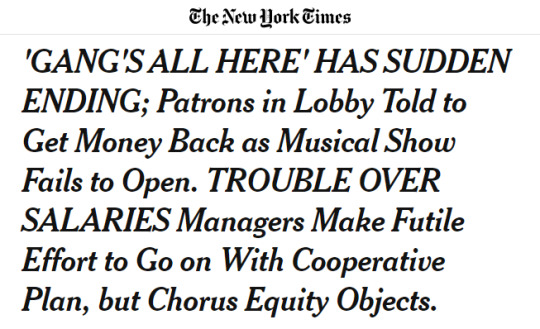
The show ended abruptly, with patrons arriving to be told the show had prematurely ended its run.
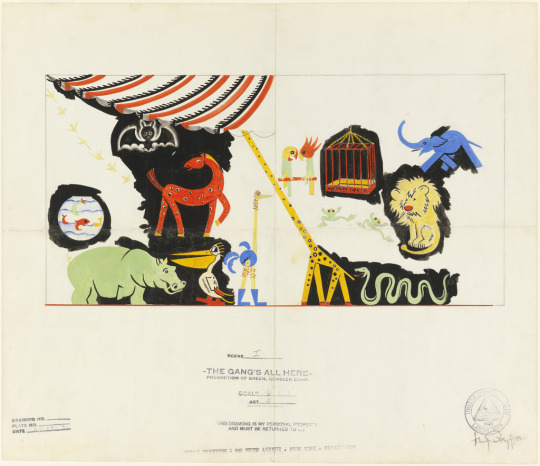
Set drawing for the first scene of Act One of The Gang’s All Here. It was designed by Henry Dreyfuss. It is unclear how this ties into the scene description in the program of “On the Boardwalk at Atlantic City”. But the drawing is dated February 14, 1931, just four days before the show’s Broadway opening, and well past the preview period. In addition to re-writes, it is likely that scenic changes were also made.
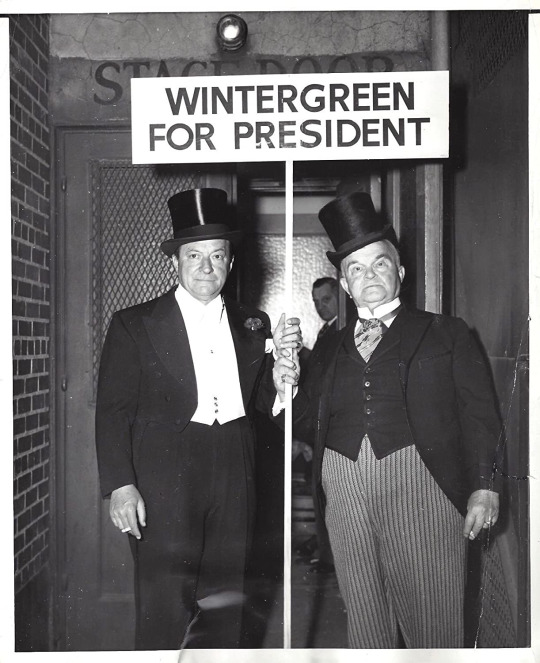
If anything good came from the musical, it seems that one of the character names - Winterbottom - was recycled into the Pulitzer Prize-winning musical Of Thee I Sing (coincidentally also set in Atlantic City) which opened just a few months later. In it, there the President was named Wintergreen and the Vice President Throttlebottom. The common thread was book writer Morrie Ryskind created both shows.
ATLANTIC CITY
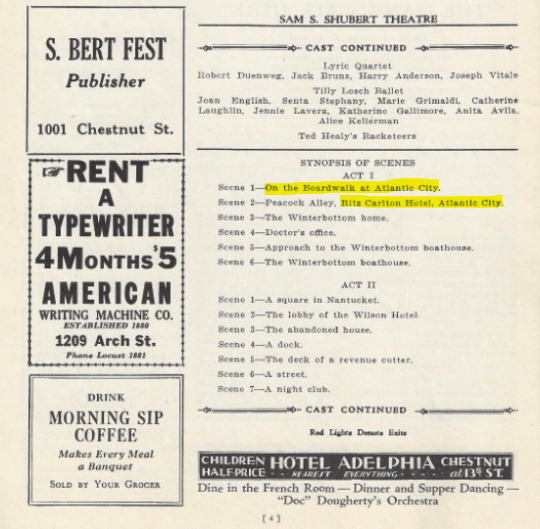

In 1931, the Ritz Carlton Hotel in Atlantic City was marking its first decade, and was already known for it’s superior service and accommodation. In 1921, another musical was set at the Ritz titled Ritz Carlton Nights. That one, however, unlike The Gang’s All Here, actually originated in Atlantic City.
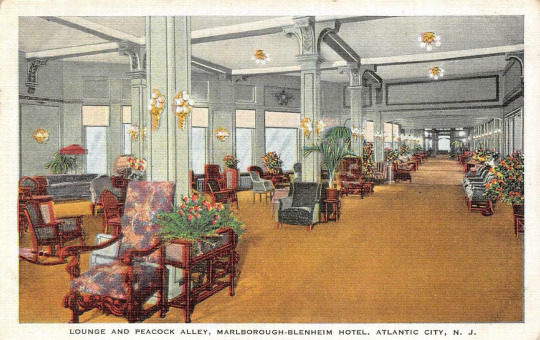
Peacock Alley was not located at the Ritz, but at the Marlborough-Blenheim Hotel. It was so named because it was the connecting hallway between the conjoined Marlborough and Blenheim hotels, and allowed guests to “peacock” (strut in their finery) for the perusal of other guests.

Interestingly, when the HBO series “Boardwalk Empire” (which also concerned bootleggers during prohibition), showed the Ritz, it was actually modeled on the Marlborough-Blenheim’s more exotic exterior, not the actual Ritz’s boxy frame.

The Boardwalk in 1931. In 1930′s Atlantic City, it could be truly said that “the gang’s all here.”
#Atlantic City#New Jersey#The Gang's All Here#Broadway#Musical#Phildelphia#Newark#1931#Imperial Theatre#New York City#Boardwalk#Ritz-Carlton Hotel#Marlborough-Bleinheim Hotel#Peacock Alley#Nantucket#Of Thee I Sing#Morrie Ryskind#Oscar Hammerstein II#Boardwalk Empire
13 notes
·
View notes
Video
youtube
Groucho Marx Animal Crackers, 1930
This may be one of the funniest exchanges in all the Marx Brothers movies. Watching Margaret Irving, who plays Mrs. Rittenhouse, try to keep from laughing during the last “strange interlude” may be my personal favorite moment. Margaret Dumont is, of course, always a pro, even when Grouch whinnies at her.
And Animal Crackers is full of scenes like this with very little plot to get in the way of the jokes. Which makes sense, as it was adapted from a Broadway play by Morrie Ryskind, George S. Kaufman and Harry Ruby. As a play, it’s the one that put the Brothers on the map as huge stars and was their second film after Coconuts.
It’s got an interesting history, too. It was chopped up pretty badly by the Hays Code upon its 1937 re-release. It wasn’t until 2015 when a pre-Code uncut version was found in the British Film Institute Archives. Furthermore, the movie company that made it, Paramount, let the rights lapse back to the original authors, Ryskind, Kaufman, and Ruby. It hadn’t been shown on television since 1950 and was rarely seen in theaters or film festivals due to the problems with licensing.
It wasn’t until the ‘70s when the heirs of the writers and Groucho were able to come to a financial agreement. It was shown at a film festival at UCLA, five months before Groucho died and there was almost a riot. He said it was his favorite of all the movies the Brothers did. It was finally shown on television again in 1979, four months before the last surviving Brother, Zeppo, died at 81.
#Marx Brothers#Paramount#Margaret Dumont#Margaret Irvin#Groucho Marx#Zeppo Marx#Chico Marx#Harpo Marx#Harry Ruby#George S. Kaufman#Morrie Ryskind#classic comedies
2 notes
·
View notes
Video
youtube
#Animal Crackers#Victor Heerman#Bert Kalmar#Harry Ruby#George S. Kaufman#Morrie Ryskind#Groucho Marx#Harpo Marx#Chico Marx#Zeppo Marx#Lillian Roth#Paramount Pictures
1 note
·
View note
Photo










My Man Godfrey (Gregory La Cava, 1936).
#my man godfrey (1936)#gregory la cava#morrie ryskind#eric hatch#zoe akins#robert presnell sr.#my man godfrey#william powell#carole lombard#ted tetzlaff#ted j. kent#russell f. schoengarth#charles d. hall#al servicio de las damas
192 notes
·
View notes
Photo

future Marx Brothers screenwriter and right-wing pundit, Morrie Ryskind, got his start as a theatrical publicity man
2 notes
·
View notes
Photo
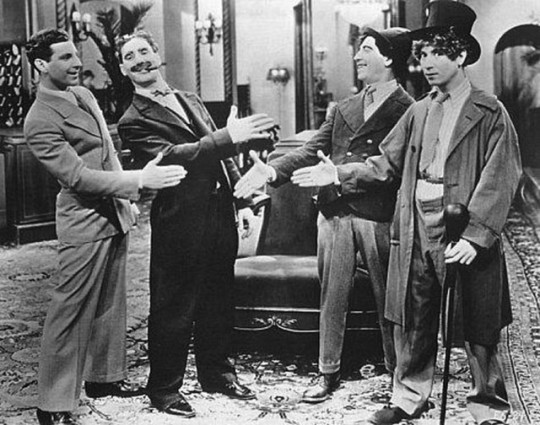
The Cocoanuts, book by George S. Kaufman with additional material by Morrie Ryskind, music & lyrics by Irving Berlin, directed by Oscar Eagle, musical staging by Sammy Lee. Opened at the Lyric Theater on December 8, 1925 and closed on August 7, 1926 (276 performances).
Jamison Zeppo Marx Eddie Georgia Hale Mrs. Potter Margaret Dumont Harvey Yates Henry Whittemor Penelope Martin Janet Velie Polly Potter Mabel Withee Robert Adams Jack Barker Henry W. Schlemmer Grouch Marx Willie the Wop Chico Marx Silent Sam Harpo Marx Hennessey Basil Ruysdael Frances Williams Frances Williams
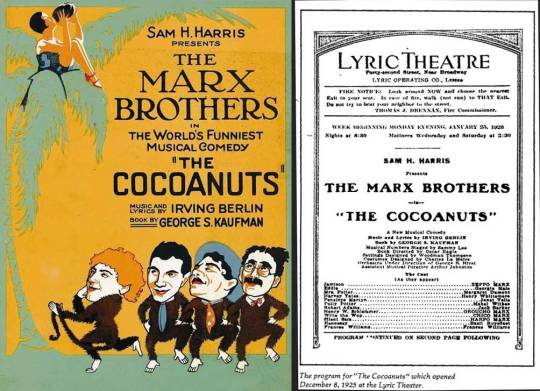
The brothers’ second Broadway show and first musical, The Cocoanuts was set amidst the Florida land boom of the 1920s (before it collapsed). Groucho is a hotel proprietor, land impresario, and con man, assisted and hampered by two inept grifters, Chico and Harpo, and the somber hotel assistant, Zeppo. Groucho pursues a wealthy dowager ripe for a swindle, played by Margaret Dumont, who would go on to appear as essentially the same character in most of the Marx Brothers’ films. Billy de Wolfe was in the ensemble.
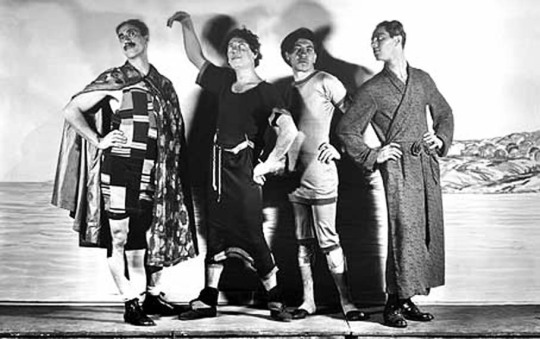
The score, by Irving Berlin, yielded only one standard—a big one, but it was pulled from the show before it opened. “Always” bothered Kaufman, who argued that “I’ll be loving you always” made no sense. He said that if the lyric ran, “I’ll be loving you, Thursday,” he might accept it. The song was dropped but became one of Berlin’s biggest hits.
The brothers improvised so wildly with Kaufman’s script that he eventually left in disgust, and Morrie Ryskind was brought in to shore up the book. (But Kaufman would work with the brothers again, on the script for A Night at the Opera.)
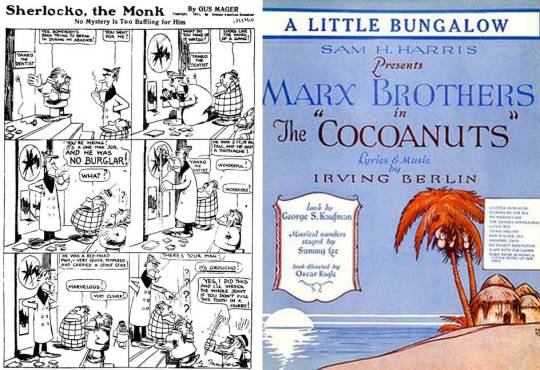
After the initial Broadway run, The Cocoanuts was taken on tour, then revived on Broadway with a number of changes. The 1929 movie was made at the Astoria Studios in Queens, and dropped some of Berlin’s songs.
Immediately above: the comic strip from which the Marxes got their stage names, and some sheet music from the show.
37 notes
·
View notes
Photo
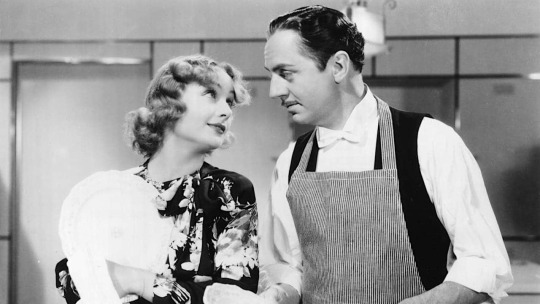
My Man Godfrey https://bit.ly/3CypeOk William Powell wouldn’t make screwball comedy My Man Godfrey without Carole Lombard as his co-star. It’s not every actor who insists on getting the ex-wife in to play love scenes (they’d divorced three years earlier) but watching the results you can see why. It’s an exquisite film, superbly directed and brilliantly written but it’s the acting that is the best thing about it. David Niven and June Allyson would star in a remake in 1957, but good though they are, they stand no chance against Powell and Lombard in full spate in 1936, not to mention the whole rest of the cast. There isn’t a role in this film that isn’t filled by … Read more
0 notes
Text
Another new episode!
Script below the break.
Hello and welcome back to The Rewatch Rewind! My name is Jane, and this is the podcast where I count down my top 40 most frequently rewatched movies in a 20-year period. Today I will be talking about number 15 on my list: Columbia Pictures’ 1940 fast-talking comedy His Girl Friday, directed by Howard Hawks, written by Charles Lederer (and uncredited Ben Hecht and Morrie Ryskind), based on the play “The Front Page” by Ben Hecht and Charles MacArthur, and starring Cary Grant, Rosalind Russell, and Ralph Bellamy.
After a four-month absence, reporter Hildy Johnson (Rosalind Russell) returns to the office of The Morning Post to inform her ex-husband/boss, editor Walter Burns (Cary Grant), that she is about to marry insurance agent Bruce Baldwin (Ralph Bellamy), settle down, and quit the newspaper business for good. Desperate to win her back, both professionally and romantically, Walter entices Hildy to write one last great story for the paper, while doing everything he can to sabotage her relationship with Bruce.
I don’t remember any of my first impressions of this movie, or if I had seen it before I started keeping track. I assume it was one of the many old movies I got from the library relatively early in my foray into Old Hollywood, so I might have seen it in 2002. I definitely saw it once in 2003, once in 2005, once each in 2007 through 2009, three times in 2010, three times in 2012, once in each year from 2013 through 2016, twice in 2017, once in 2018, twice in 2019, and twice in 2022. I know that in 2010, I took a class at community college called “film as literature,” in which some assignments involved picking a movie and three different aspects of filmmaking, and discussing how those three aspects enhanced the story of that particular film. The instructor advised us to watch the movie we were writing about three times, focusing on a different aspect each time, and His Girl Friday was one of the movies I wrote a paper like that about (I focused on dialogue, props, and lighting), so that explains the three times in 2010. But I can’t think of a good explanation for why I watched it three times again in 2012, aside from the fact that it’s a great movie that I always enjoy watching. It’s also one that feels particularly appropriate to include in my annual Cary Grant birthday marathon, because it happened to come out on his birthday in 1940, so that’s part of why I watch it almost every year.
By far the best and most noteworthy aspect of this movie is its rapid-fire dialogue. Yes, a lot of old movies are very dialogue-heavy with people talking pretty fast, but like, His Girl Friday takes it to a whole other level. A typical movie averages around 90 words of dialogue per minute; His Girl Friday averages around 240. Many lines were specifically written so that the beginning and the end didn’t matter, allowing the actors to talk over each other, as people do in real conversations, without preventing the audience from understanding what was going on. All the fast, overlapping talking is particularly impressive given that multi-track recording hadn’t been developed yet, so they couldn’t adjust the volumes of different speakers separately in post-production; they just turned different overhead microphones on and off so the primary speaker was louder when they were recording, with some scenes reportedly requiring up to 35 switches – shout out to that sound department. At the time, the record for fastest film dialogue was held by the 1931 version of The Front Page, and director Howard Hawks was determined to break it with this adaptation, which he later proved he had done by screening the two versions next to each other. He also encouraged the actors to improvise, which made filming take longer – as it had with his earlier Bringing Up Baby – but helped the conversations feel even more authentic. Rosalind Russell felt that Cary Grant had more good lines in the script than she did, so she hired her own writer to help enhance her dialogue. Apparently at one point, after she did something unscripted, Grant broke character and said into camera, “Is she going to do that?” which Hawks really wanted to keep in the movie, but ultimately didn’t make the final cut. But several noteworthy ad-libs remained, including at least two, possibly three, amazing inside jokes. One is when Walter says, “He looks like that fellow in the movies…Ralph Bellamy” about Bruce, who did, in fact, look exactly like Ralph Bellamy, the actor playing him. And then there’s the part when the mayor says, “You’re through,” and Walter replies with, “The last man that said that to me was Archie Leach,” in reference to Cary Grant’s birth name – yes, he had the same birth surname as me, but we’re not related as far as I know. And the third, which has not been officially confirmed as an ad-lib or intentional reference but might have been, is when Walter calls the man hiding in a desk a “mock turtle,” which was the character Grant played in the 1933 Alice in Wonderland movie.
So basically, this film was made specifically for Cary Grant fans, and that’s a big part of why I love it. Walter Burns is one of his less likable characters – he’s selfish and deceptive and manipulative – but also one of his most fun to watch. Grant nails every beat of the breakneck-paced dialogue, knowing exactly when to pull focus toward himself and when to fade back to let his scene partner shine through. He still keeps going in the background, though, which helps make this movie especially rewatchable. As you can probably tell from the mere existence of this podcast, I enjoy rewatching movies anyway, but with His Girl Friday in particular, there are so many excellent moments that I didn’t notice until I’d seen the whole film many times, and I’m still noticing new things with every rewatch. While you don’t need to hear the overlapping bits of dialogue to follow the movie, once you’re familiar with the story it’s very fun to go back and listen for the parts you missed before. And several actors – Grant in particular – make some great reaction faces in the background that are worth watching out for. So if you’ve only seen this movie once, I would highly recommend revisiting it.
And it’s not just Cary Grant – Rosalind Russell is absolutely fabulous in this movie. Hildy Johnson was a man in The Front Page, but when Howard Hawks heard his female secretary reading the lines during auditions, he thought they sounded great coming from a woman and decided to turn Hildy into Walter’s ex-wife. It would have been nice if they could have changed one of the main characters into a woman without making her automatically romantically involved with the other main character, but we can’t have everything. Many actresses were considered but ended up either turning it down or being too expensive to hire. Russell knew she was not a top choice and was apparently very insecure about that, but she had no reason to be because she was perfect. All the reporters in the movie talk ridiculously fast, but she leaves them in the dust and makes it look easy. It took me many takes just to quote part of one of her many rapid monologues at the end of last episode without tripping over my words; I don’t know how she did it. And while she’s talking a mile a minute, she’s also portraying an incredibly layered and nuanced character. The wonderful character actors playing the other reporters do a great job of conveying that they have embraced the cold, detached mindset of caring more about the scoop than the story itself. Hildy shares this to a certain extent, but she hasn’t completely lost her sense of empathy the way they have. She fits in with the guys, but she’s also better than them, both as a journalist and as a human being, without seeming too perfect to be realistic, which is an incredibly complex and difficult balance to strike, but again, Rosalind Russell nails it. Much as I love Grant’s performance, Russell is really the glue that holds the whole thing together, and she commits to that role completely.
Hildy is such a strong character that I’m always disappointed when she goes back to Walter at the end. She is clearly a much better match with him than with Bruce, whose slow, deliberate speech contrasts rather jarringly with Hildy and Walter’s snappy patter. But Walter has learned exactly zero lessons by the end of the movie, and there is no reason to believe that any of the problems with their first marriage will ever be resolved. Throughout the movie, Hildy is torn between wanting the domestic life of Bruce’s wife and the more hectic life of a newspaper reporter that still has a hold on her. When Walter tells her she can’t quit because she’s a newspaperman, she replies that that’s why she’s leaving, so she can be a woman. But as much as she complains about it, she makes it pretty clear that she does love being a reporter. I think there is a part of her that genuinely likes the idea of settling down as a housewife, but it seems like the main reason she wants to do that is because society is telling her that’s what women are supposed to do. So I’m very glad the movie doesn’t make her marry Bruce. I also recognize that at the time it was rather radical to suggest that a woman should pursue a career in something other than homemaking if she wants to, let alone suggest that she doesn’t have to completely give up the idea of having a husband to do so. In 1940 it was highly unusual to show a man wanting his wife to also have a career like Walter does. So from that perspective it is kind of nice to see them get back together. But at the same time, he treats her pretty terribly, and it kind of feels like it’s saying that a career gal should be happy with any man she can manage to get, regardless of how slimy he is. Not that Hildy doesn’t also treat Walter pretty terribly too. I guess they show their affection by hurling insults at each other, which is a type of relationship that makes no sense to me, but they seem to be on the same page about it. Still, I would love to see Hildy walk out on both Walter and Bruce like the strong, independent woman she is. At least the movie makes it clear that, despite its title, she is nobody’s assistant, or “girl Friday.”
The progressive for 1940 but doesn’t quite work now theme extends beyond feminism. Besides the Walter/Hildy/Bruce love triangle, the other main storyline in the movie involves a man named Earl Williams, played by John Qualen, who is about to be hanged for killing a policeman, despite some legitimate questions regarding his sanity. Walter wants Hildy to do one final interview with Earl to show that he definitely wasn’t responsible for his actions, and that he’s being strategically executed a few days before an election so the incumbent sheriff and mayor will look tough on crime and win. Most of the reporters don’t seem to care, asking the sheriff if he can move the execution up a few hours so it can make their morning editions. The sheriff refuses, but it is very clear that he could not care less about upholding the law, and same with the mayor, because when a messenger from the governor arrives with a reprieve, they try to bribe him to leave and come back later so they can still execute Williams and pretend the reprieve arrived too late. And it’s not just the politicians who are corrupt. Hildy bribes a prison guard twice: first to get an interview with Earl Williams, and then to find out how he managed to get a gun and escape. Then when Hildy and Walter find Williams, they hide him, not because they think he’s innocent and want to save him, but because they want to be able to turn him in after they’ve written the story of how they captured him. The movie’s statements about the way American society treats working-class people on the fringes, like Earl, and the way the criminal justice system is easily manipulated for political or financial gain, are honestly still pretty accurate, for the most part. But in a bizarre twist, Walter tells Bruce and Hildy that the policeman Earl shot was black, and that the politicians are trying to get votes from black people by executing his white killer, which is just, so completely backwards from how anything actually works that it kind of detracts from the legitimate points the movie does make. Everything about this story just screams late 1930s/early 1940s, from the characters’ world views to the costumes to the current event references, which makes sense given when the movie was made, but is completely inconsistent with the written prologue at the beginning, which states: “It all happened in the dark ages of the newspaper game – when to a reporter getting that story justified anything short of murder. Incidentally, you will see in this picture no resemblance to the men and women of the press today. Ready? Well, once upon a time—” It’s like, nice try, but in 1940 you can’t pretend this is set in a bygone era and then talk about Hitler and the European war. I don’t think they were really fooling anyone, but at least this allowed the filmmakers to get away with criticizing journalists without getting sued or censored.
Speaking of being censored, one of the few female characters in this movie, Mollie Malloy (played by Helen Mack), kind of seems like she’s supposed to be a prostitute, but of course they weren’t allowed to say that so it’s not super clear. What we do know is that she befriended Earl Williams shortly before he was arrested and has visited him in jail, and that the press has been inaccurately representing the nature of Earl and Mollie’s relationship. I don’t know if it was partly because of the Hays Code that they specifically state that Earl and Mollie haven’t slept together, but regardless of the reason, I’m always a fan of platonic male/female friendship. And the way the movie shows that they care about each other deeply in a non-sexual way, while portraying the reporters as wrong for sexualizing their relationship, feels almost like it’s saying “asexual rights” and we love to see it. We don’t really know what’s going to happen to Earl and Mollie after the events of the film, but I hope that Earl gets the mental health care he needs – he won’t because it’s 1940 but we can pretend – and that Mollie fully recovers from jumping out of the window – we know she’s alive but not how badly she’s hurt – and that they remain close friends.
While this movie touches on a lot of dark themes, overall the tone is lighthearted. It feels like it’s exposing the world for the hellscape that it is and laughing at it. And while some of its attitudes feel very outdated and problematic, that mood is still relatable. His Girl Friday is hectic and chaotic and screwball, but it manages to remain at least somewhat grounded and real. So watching it can feel like either escaping from the real world or looking into a mirror held up to the real world, depending on what the viewer chooses to focus on. This makes it an appropriate movie to watch in many different moods, which helps explain why I revisit it so often. That and the incredible fast-talking performances that I’m still in awe of. And, of course, Cary Grant’s presence always helps.
Thank you for listening to me discuss another of my most frequently rewatched movies. Next up is the fourth and longest movie I watched 22 times in 20 years, which is also from the 1940s, so stay tuned for another oldie. It is also probably the most disturbing movie on this list, just to warn anyone who may be watching along. As always, I will leave you with a quote from that next movie: “Are you suggesting that this is a knife I hold in my hand?”
9 notes
·
View notes
